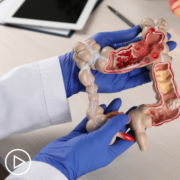What Are Colon Cancer Screening Guidelines?
What Are Colon Cancer Screening Guidelines? from Patient Empowerment Network on Vimeo.
What are the guidelines for colon cancer screening? Dr. Suneel Kamath explains the current recommendations, including the appropriate screening age and reviews risk assessment based on factors such as family history and race.
Dr. Suneel Kamath is a medical oncologist at the Cleveland Clinic Taussig Cancer Center. Learn more about Dr. Kamath.
See More from DETECT Colon Cancer
Related Resources:

|

|

|
Transcript:
Katherine:
It seems like the suggested ages for screening may vary based on gender and race and family history. What are the current screening guidelines?
Dr. Kamath:
The current screening guidelines that are unfortunately due this rise, there is now recommendation for starting colon cancer screening at age 45. That’s really for everybody. There are certain people that really should be screened even earlier. We definitely know that the black community is affected at a higher rate. There are some professional societies, like the AGA or ACG, that actually recommend starting even earlier in the black community, maybe even by age 40.
And then, the other thing I always try to emphasize is with this is the usual screening guidelines that we talk about are for what we call the average risk population. I do think that we overestimate how many people are average risk. One of the things that I think is not talked about as much is that if you have a family history of even polyps – high risk polyps – that also means that your family members should get screened earlier, 10 years earlier, than the age that you were found to have a high-risk polyp.
But my experience has been most people don’t share with their families that they had those. Let’s say I had a colonoscopy done one day and they found those, they get taken out, and they just say, “Oh, come back in three years,” instead of 10. As far as I’m concerned, that’s where it ends. But actually, the fact that I had those polyps has implications for my siblings, for children, and everything. I don’t think most people are in the habit of disseminating that information. As a result of that, a lot of people are probably at increased risk and they’re really not aware of it.
Katherine:
Yeah. Where can patients find the most up-to-date information regarding screening?
Dr. Kamath:
The best resource, to me, is the American Cancer Society, their websites. They’re highly reliable, they’re easy to understand, and I find that they’re very balanced. They’re not going to be overly pushing one side or the other. But they’re going to be evidence-based. As we all know, there is so much fake news and misinformation out there, especially when it comes to health. I think having a resource you could really trust and understand is key and the American Cancer Society, you find, is an excellent resource.




